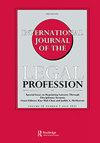Female lawyers in Egyptian and Lebanese films over the last 75 years: caretakers and anomalies with limited back stories
IF 0.9
Q2 LAW
International Journal of the Legal Profession
Pub Date : 2023-04-27
DOI:10.1080/09695958.2023.2197602
引用次数: 0
Abstract
ABSTRACT Women in the Arab world have never had better access to education and professional careers. Despite this, gender stereotypes are hampering women’s progression towards gender equality. This article considers how the representation of women in film is contributing to the issue. The representation of female lawyers in Lebanese and Egyptian cinema over the last 75 years demonstrates gender disparity. On the scarce occasions when female lawyers are represented, they are confined to a caretaker role and associated with family disputes. By associating female lawyers with the family, they are put into the traditional Arab role of a woman, reinforcing the imbedded stereotypes that hamper the career progression of Arab women. We do not see male family members contributing to family obligations, which would demonstrate a significant move towards gender parity. Female lawyers are often defined by a relationship, romantic or otherwise, with a male protagonist. This perpetuates the patriarchal norm that Arab women are subordinate to their male relatives. There has been a shift towards greater gender equality in the representation of female lawyers in contemporary portrayals in Lebanese cinema. However, female lawyers still most often appear in isolation, giving them the status of an anomaly, the “Other”.在过去的75年里,埃及和黎巴嫩电影中的女律师:有着有限背景故事的看门人和异类
摘要阿拉伯世界的妇女获得教育和职业发展的机会前所未有。尽管如此,性别陈规定型观念正在阻碍妇女实现性别平等。本文探讨了女性在电影中的表现是如何促成这一问题的。过去75年来,女性律师在黎巴嫩和埃及电影界的代表性表明了性别差异。在女性律师很少有代表的情况下,她们被限制在看护角色,并与家庭纠纷有关。通过将女律师与家庭联系起来,她们被赋予了传统的阿拉伯女性角色,强化了阻碍阿拉伯女性职业发展的根深蒂固的刻板印象。我们没有看到男性家庭成员为家庭义务做出贡献,这将表明朝着性别平等迈出了重大步伐。女性律师通常被定义为与男性主角的关系,无论是浪漫的还是其他的。这延续了阿拉伯妇女服从男性亲属的父权制规范。在黎巴嫩电影的当代形象中,女律师的代表性已经向更大的性别平等转变。然而,女律师仍然经常孤立地出现,这给了她们一种反常的“他者”的地位。
本文章由计算机程序翻译,如有差异,请以英文原文为准。
求助全文
约1分钟内获得全文
求助全文

 求助内容:
求助内容: 应助结果提醒方式:
应助结果提醒方式:


